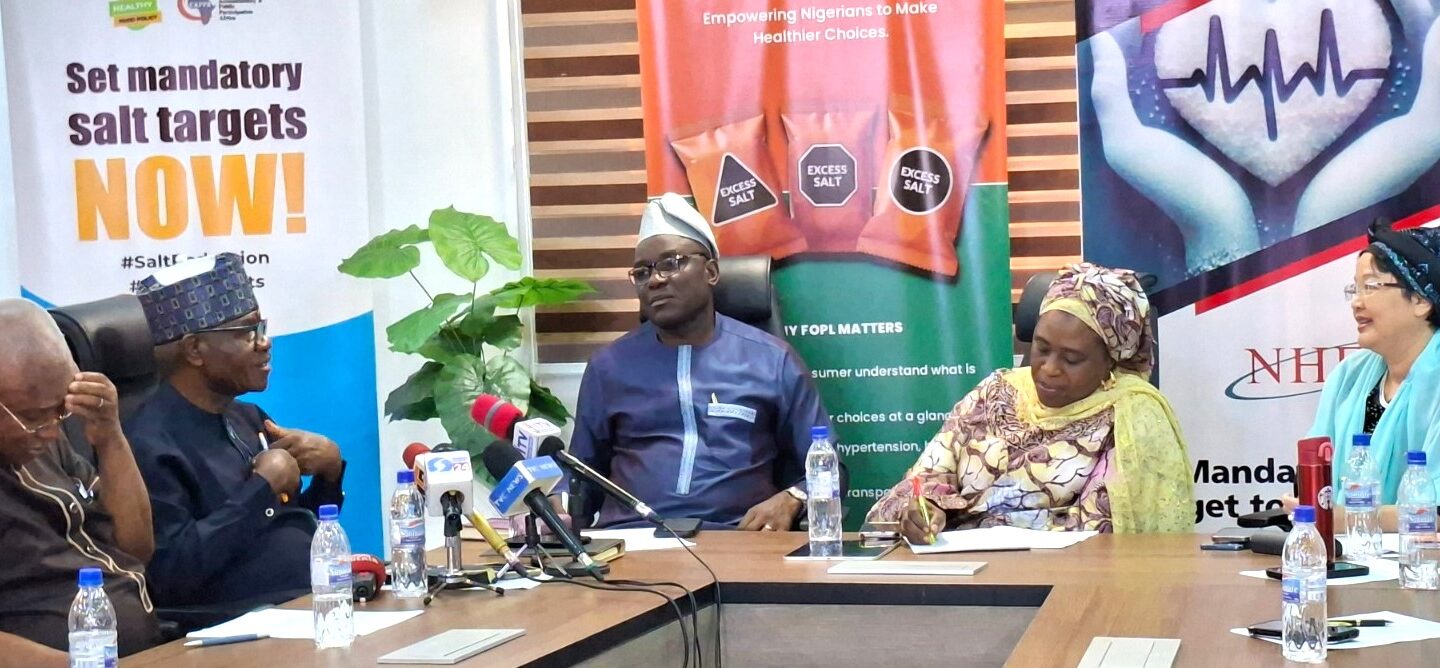
By Dan-Maryam Zayamu
Nigeria is currently facing a rising and preventable burden of diet-related Non-Communicable Diseases (NCDs), including hypertension, heart disease, and stroke, says the Special Adviser to the President on Health, Dr. Salma Anas.
She stated this at a media parley to commemorate the World Food Day 2025, in Abuja, yesterday.
She, however, explained that the President Bola Ahmed Tinubu-led federal government is through the Federal Ministry of Health and Social Welfare, in collaboration with NAFDAC and the Standards Organisation of Nigeria (SON), has made significant progress in halting the situation.
“We are advancing the draft Sodium Reduction Regulation and the Front-of-Pack Labelling Framework, aligning with the WHO SHAKE Package. These initiatives aim to reduce salt intake by 30% by 2025, supporting the United Nations Political Declaration on Non-Communicable Diseases and the Sustainable Development Goal 3.4. Through these efforts, Nigeria is demonstrating real leadership in translating global health goals into local progress. We are committed to fostering an environment where every Nigerian can see, know, and choose healthy food options,” she further noted.
According to the President’ Aide, “Excessive sodium intake is a major, modifiable driver of high blood pressure and avoidable illness across our population. The toll of poor diets extends beyond the clinic: it reduces household income, weakens workforce productivity, and increases the fiscal burden of healthcare on families and the state.
“Reducing population sodium intake is therefore both a public health imperative and an economic priority that requires coordinated action across ministries, regulators, industry, and communities.”
She, however, expressed concern that many Nigerians consume salt in excess of the recommended levels set by the World Health Organization, explaining that this dietary habit significantly contributes to higher blood pressure and avoidable health complications.
“The implications of this health challenge extend far beyond individual well-being. They ripple through our economy, impacting family incomes, workforce productivity, and escalating healthcare costs. Therefore, addressing sodium intake is not merely a health concern; it is a pressing economic priority that demands collective and sustained action across sectors,” Dr. Salma stressed.
She further noted that Front-of-Pack labelling gives consumers clear, visible information so families can easily recognise foods that are high in salt, sugar, or unhealthy fats and make healthier choices.
“Simple symbols and mandatory sodium declarations on nutrition panels drive transparency, strengthen consumer confidence, and create a market incentive for producers to reformulate.
“Mandatory sodium limits protect those who cannot easily change behaviour by ensuring the food environment supports healthier defaults. Together, these policies make it easier for every Nigerian to see, know, and choose what they eat,” she said.
The President’s Adviser further argued that food industry holds a critical role in this transformation, stressing that: “Reformulating products and adopting responsible labelling practices can spur innovation, build consumer trust, and create new market opportunities; thus, companies that align with Nigeria’s sodium standards will gain a competitive advantage locally and internationally.
“The Presidency encourages industry stakeholders to view compliance with sodium reduction standards as a pathway to growth rather than a constraint.”
While pledging that the government will continue to provide the necessary leadership, coordination, and regulatory muscle across all relevant ministries and agencies, especially NAFDAC, she called on industry leaders to embrace reformulation and responsible marketing as an opportunity for innovation, and view the upcoming regulations as a chance to demonstrate your commitment to consumer health.
She also called on the Civil Society Organisations and Development Partners to sustain advocacy, monitor implementation, and hold institutions and companies accountable for progress and continue technical and financial collaboration to support capacity, surveillance, and consumer education at scale.
“Let your health guide your taste. Begin to scrutinize labels, demand healthier options, and advocate for food that sustains life rather than disease,” Dr. Salma charged citizens.
On her part, the Cluster Lead, Disease Prevention and Control, World Health Organization (WHO), Dr. Mya Sapal, stressed her organisation’s commitment to supporting Members States to implement, monitor and enforce policies and other measures to ensure that every adult and child enjoys healthy food environments to realize their human right to safe, secure and nutritious food, and the highest attainable standard of health.
She, therefore, called on governments at all levels to adopt and implement standards for Front-of-Pack Labelling and marketing restrictions and improve surveillance on salt/sodium population intake, salt/sodium food content, and salt/sodium dietary sources.
She charged industry leaders to implement the National sodium targets and benchmarks, reformulate food products to contain less salt/sodium and that the Civil Society and consumers to advocate and demand for lower sodium in processed foods.
Speaking, the Country Director, Network for Health Equity and Development (NHED), Dr. Emmanuel Sokpo, revealed that Nigeria is experiencing what he described as a “silent but growing crisis of diet-related non-communicable diseases.
Hypertension, heart disease and stroke are increasing at alarming rates, affecting people in their most productive years.”
According to him, the WHO identifies excess sodium intake as one of the leading dietary risk factors for these diseases and that evidence has shown that the average Nigerian consumes well above the recommended daily limit of 2,000 milligrams of sodium, roughly one teaspoon of salt.
This, he maintained, has significant consequences including rising medical costs, reduced productivity and preventable deaths, further insisting that reducing sodium intake is therefore not only a health intervention but also a development priority that affects the economy and human capital.
















